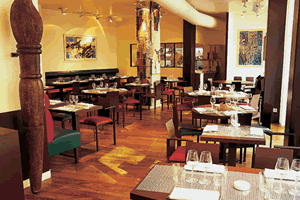Good Cooking

- SUBSCRIBE
- ALREADY SUBSCRIBED?
BECOME A BONJOUR PARIS MEMBER
Gain full access to our collection of over 5,000 articles and bring the City of Light into your life. Just 60 USD per year.
Find out why you should become a member here.
Sign in
Fill in your credentials below.
 I am frequently asked after eating at a new or made-over restaurant what sort of cuisine the chef cooks; traditional, nouvelle, minceur, post-nouvelle, fusion, sous vide, molecular, etc. More and more these days my answer is: “Good food.”
I am frequently asked after eating at a new or made-over restaurant what sort of cuisine the chef cooks; traditional, nouvelle, minceur, post-nouvelle, fusion, sous vide, molecular, etc. More and more these days my answer is: “Good food.”
It’s my hunch that the reason for this is that the new chefs aren’t bound by the old rules. My version of history may be revisionist but here it is:
In the very old days, chefs came up the apprentice route. If lucky, they worked with more than one master but many worked with only one sole “monster” and they carried out his recipes day after day, year after year, without deviation. When schools came into existence, student chefs still learned basic cooking and sauces according to the book; again deviation, innovation and modification were not encouraged.
In terms of who these chefs were, certainly in our memory, the historical giants were Bocuse, Bise and the Troisgros’s. Without diminishing the role of Christian Millau and Henri Gault, they largely promoted the revolution of nouvelle cuisine by favoring the existing food prepared by innovative chefs such as Point, Guerard, Senderens and Passard. When Michel Guerard moved on to introduce cuisine minceur, few followed, but as nouvelle turned into post-nouvelle, eclectic cooking became permissible. The most extreme wing of the eclectic movement was that of fusion cooking, most frequently the blending of various Asian cuisines and French cooking, but examples of Anglo-French, Italian-French and Spanish-French also existed. During these years, Tateru Yoshino at Stella Maris, William Ledeuil at Ze Kitchen Galerie and Gilles Choukroun at Le Café des Delices were the envelope-pushers. Next, s ous vide cooking, as practiced at the Troisgros restaurant and by Bocuse and Robuchon, as well as molecular cuisine, promoted by Pierre Gagnaire and Herve This, have swept French kitchens, as they have elsewhere, especially in the US. And most recently we have watched as Luc Dubanchet et al at LeFooding pushed for the type of cooking practiced by the Generation “C” chefs – Zuddas, Choukroun, Ledeuil, Marx , Aizpitarte, etc.
Interestingly, the average and above-average chefs and schools absorbed the changes brought about by each of these revolutions, trends, and at times, fads. The present-day cynics cavil at the lack of real change and innovation compared to what’s going on elsewhere (the New York Times Magazine article last year on El Bulli being the driving culinary force in Europe these days, didn’t help). But optimists like me see things half-full.
Now, I think, more and more chefs are self-taught or flit through kitchens like bees in clover and even those who stay for longer periods of time want to break out and do something a bit different than their masters or restos were used to doing. It was famously said that Bernard Loiseau was constantly changing, advancing and tinkering with dishes, preparations, etc. in his quest to be the best and most innovative. And I recall Rex Harrison being quoted on how he could play ‘enry ‘iggins in My Fair Lady the same way, every night, night after night, without being bored stiff. Paraphrased, his response was something like “Who says I play the role the same?”
So it is that both young and old chefs can be unfairly lumped in two categories: the repeaters and the movers & shakers. Some repeaters are to be cherished because they are willing, like Ducasse and Westermann, to keep the flames going at places like Aux Lyonnais, Benoit, Drouant, the Jules Verne and Rech; others, like Ducasse again and Robuchon, want to spread the word worldwide; and yet others, though, just repeat and repeat and that would make even Rex Harrison boring.
But I want to come back to my thesis. Despite or because of all the “movements” in French cuisine, I think some of the newer generation are by their very nature, simply put – good cooks – and sui generis, keep things interesting. And it’s these guys (and women) I’d rather spend my nickel on – f olk like William Ledeuil, Daniel Rose, Cyril Lalanne, and most recently Alexandre Blanchet, as well as all the culinary children of Christian Constant.
As usual I’ll give my current favorites:
Ze Kitchen Galerie
4, rue des Grands Augustins, 6th (Metro: Saint Michel)
T: 01 44 32 00 32
Closed Sundays.
A la carte 30 €.
Spring
28, rue de la Tour d’Auvergne, 9th, (Metro: St Georges or Pigalle)
T: 01.45.96.05.72
Open Tuesday-Friday for dinner with one seating at 8:30-9 PM
Lunch Thursday and Friday at around 1 PM, seating is very limited (8-10)
Cooking classes and private parties on Saturday afternoons and evenings.
Menu du jour 36 €
Les Jumeaux
73, rue Amelot, 11th (Metro: St Sebastien Froissart)
T: 01.43.14.27.00
Closed Saturday lunch, Sundays and Mondays
Menu 34 € .
©2007 John A. Talbott


